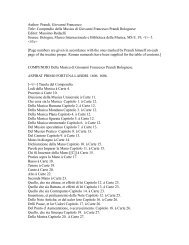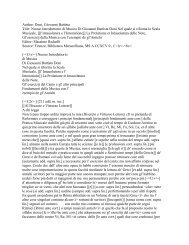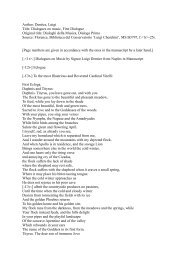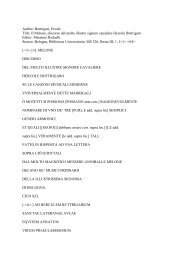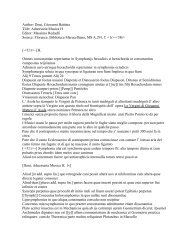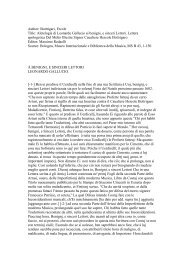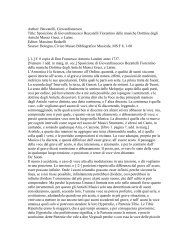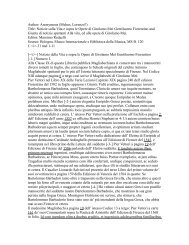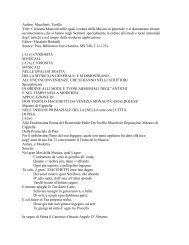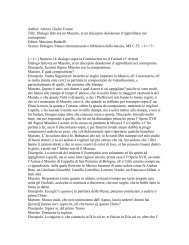Author: Doni, Giovanni Battista - manuscripts of italian music theory ...
Author: Doni, Giovanni Battista - manuscripts of italian music theory ...
Author: Doni, Giovanni Battista - manuscripts of italian music theory ...
You also want an ePaper? Increase the reach of your titles
YUMPU automatically turns print PDFs into web optimized ePapers that Google loves.
Although it is not our intention to deal with the principles <strong>of</strong> <strong>music</strong> and reiterate<br />
things said and repeated many times by the authors, which, apart from the fact that<br />
this i unnecessary to our aim, we have never liked to copy others' doctrine as many do<br />
to thicken their volumes, if not in as much as it is necessary to understand what<br />
follows, nevertheless it will be necessary to say something on the System which the<br />
ancient called large or perfect and <strong>of</strong> its features and terminology, since one will be<br />
hardly able to understand what follows without any knowledge <strong>of</strong> these. The most<br />
ancient <strong>of</strong> the Greeks, who were fathers and inventors <strong>of</strong> <strong>music</strong>, did not know but the<br />
seven notes [their lyre had four strings in marg.] which made up the System <strong>of</strong> two<br />
fourths or diatessaron, namely, <strong>of</strong> a seventh, to which then, to complete the [[octave<br />
D]] Diapason Terpander added the eighth string or note. This man, just as the<br />
Florentine painter Giotto did, improved and enhanced considerably his pr<strong>of</strong>ession,<br />
which was not refined and very simple, [--] and reduced to a state <strong>of</strong> rather<br />
greater perfection. But leaving aside [Albeit Plato in the Timaeus appears to have<br />
enlarged his System to cover four octaves and a sixth, making the number 27 as one<br />
<strong>of</strong> its extremities, nevertheless, as Aristoxenus quoted by Proclus states, he did not<br />
consider practice in this, but only nature; and, although theorists more modern than<br />
Aristoxenus proposed the Diagram <strong>of</strong> three octaves and a tone, reaching a total <strong>of</strong> 23<br />
voices, one cannot say that is was a single System or Diagram, but fifteen, as many as<br />
their tones were in marg,] aside such early starts, and the question <strong>of</strong> whether the lire<br />
had four or seven strings in the beginning and such other matters which one can learn<br />
as well from Plutarch, from Nichomacus' fragments, from Boethius and others, and<br />
from Gallileo, who deals with this inquisitively among modern writers, I will move on<br />
to discuss the complete and perfect system which was used in those most lucky times<br />
<strong>of</strong> ancient Greece when this art was treated with such diligence and exquisite taste<br />
that it seems to me that I am able to state that, if in any other pr<strong>of</strong>essions the Greeks<br />
have surpassed all the nations <strong>of</strong> the world, in this one they have surpassed<br />
themselves, in a certain sense. Therefore, I say that the system <strong>of</strong> fifteen notes was<br />
considered and called perfect with good reason, because all the perfection and variety<br />
<strong>of</strong> <strong>music</strong> is contained within it, and albeit someone might think together with the<br />
Pythagoreans (who were happy with the proportion <strong>of</strong> the number six contained in it,<br />
and which constitutes the first <strong>of</strong> all the simple and uncompounded consonances) that<br />
the system <strong>of</strong> eight notes would be sufficient and perfect, nevertheless, [[because if<br />
that interval is not sufficient from the action <strong>of</strong> that interval one finds the<br />
consona]] we do not want to become embroiled in this dispute, nor do we<br />
wanto to abandon the doctrine and [--] fundamental beliefs <strong>of</strong> those who have<br />
written about this pr<strong>of</strong>ession better than others in those times when all the arts and the<br />
sciences had already reached their highest point. Someone might be surprised<br />
perhaps, that I do not propose the System <strong>of</strong> Guido <strong>of</strong> 21 or 20 notes, namely from<br />
[Gamma] ut to e e la, which is received and practice commonly nowadays, believing<br />
perhaps that, because it is longer and ample it contains a greater level <strong>of</strong> perfection<br />
and is <strong>of</strong> greater use in <strong>music</strong>. However, the brevity and ease <strong>of</strong> use which the ancient<br />
System carries with itself, the better order which it contains, and the observation that<br />
more modern <strong>music</strong>ians have added other notes to Guido's System, both above and<br />
below it, or that it is redundant, as it appears to be in the compositions in a single part,<br />
or lacking, as in many compositions for several voices and in those for instruments,<br />
make it such that, leaving aside for now its foundations, I will stick to the most<br />
ancient ones. I will do that all the more willingly since Boethius himself, from whom<br />
Guido has derived all his doctrine, as Boethius was the only author read in those very<br />
uncultured ancient times [moreover, as Gallilei maintains the number itself <strong>of</strong> its 21



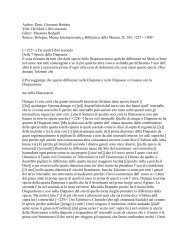
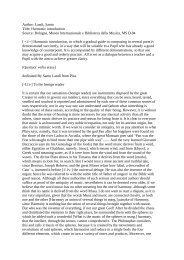
![Doni, Giovanni Battista Title: Trattato Dei Tuoni o [[Harmonie de]]](https://img.yumpu.com/45461005/1/190x245/doni-giovanni-battista-title-trattato-dei-tuoni-o-harmonie-de.jpg?quality=85)
